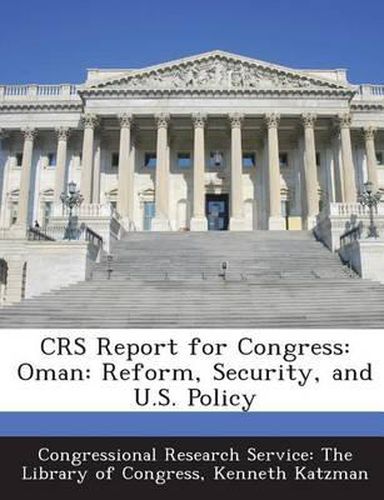Readings Newsletter
Become a Readings Member to make your shopping experience even easier.
Sign in or sign up for free!
You’re not far away from qualifying for FREE standard shipping within Australia
You’ve qualified for FREE standard shipping within Australia
The cart is loading…






Prior to the wave of unrest that has swept the Middle East in 2011, the United States had consistently praised Sultan Qaboos bin Sa'id Al Said for gradually opening the political process in the Sultanate of Oman in the early 1980s without evident public pressure. The liberalization allowed Omanis a measure of representation but without significantly limiting Qaboos’ role as major decision maker. Some Omani human rights activists and civil society leaders, along with many younger Omanis, were always unsatisfied with the implicit and explicit limits to political rights and believed the democratization process had stagnated. This disappointment may have proved deeper and broader than experts believed when protests broke out in several Omani cities beginning in late February 2011, after the toppling of President Hosni Mubarak of Egypt. The generally positive Omani views of Qaboos, coupled with economic and minor additional political reform measures and repression of protest actions, caused the unrest to subside. However, protests have continued sporadically in 2012. High turnout in the October 15, 2011, elections for the lower house of Oman’s legislative body suggested the unrest produced a new public sense of activism, although with public recognition that reform will continue to be gradual.
$9.00 standard shipping within Australia
FREE standard shipping within Australia for orders over $100.00
Express & International shipping calculated at checkout
Prior to the wave of unrest that has swept the Middle East in 2011, the United States had consistently praised Sultan Qaboos bin Sa'id Al Said for gradually opening the political process in the Sultanate of Oman in the early 1980s without evident public pressure. The liberalization allowed Omanis a measure of representation but without significantly limiting Qaboos’ role as major decision maker. Some Omani human rights activists and civil society leaders, along with many younger Omanis, were always unsatisfied with the implicit and explicit limits to political rights and believed the democratization process had stagnated. This disappointment may have proved deeper and broader than experts believed when protests broke out in several Omani cities beginning in late February 2011, after the toppling of President Hosni Mubarak of Egypt. The generally positive Omani views of Qaboos, coupled with economic and minor additional political reform measures and repression of protest actions, caused the unrest to subside. However, protests have continued sporadically in 2012. High turnout in the October 15, 2011, elections for the lower house of Oman’s legislative body suggested the unrest produced a new public sense of activism, although with public recognition that reform will continue to be gradual.